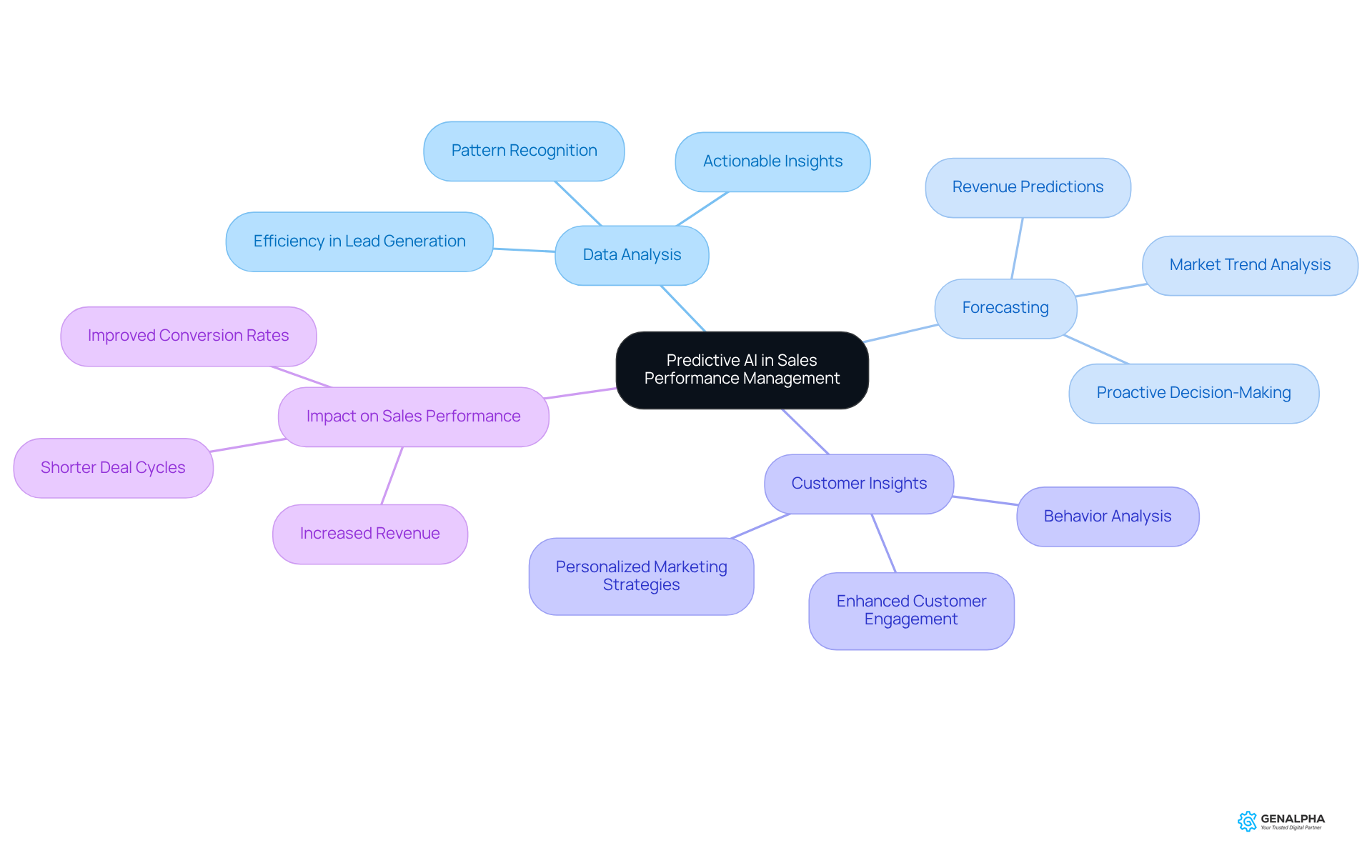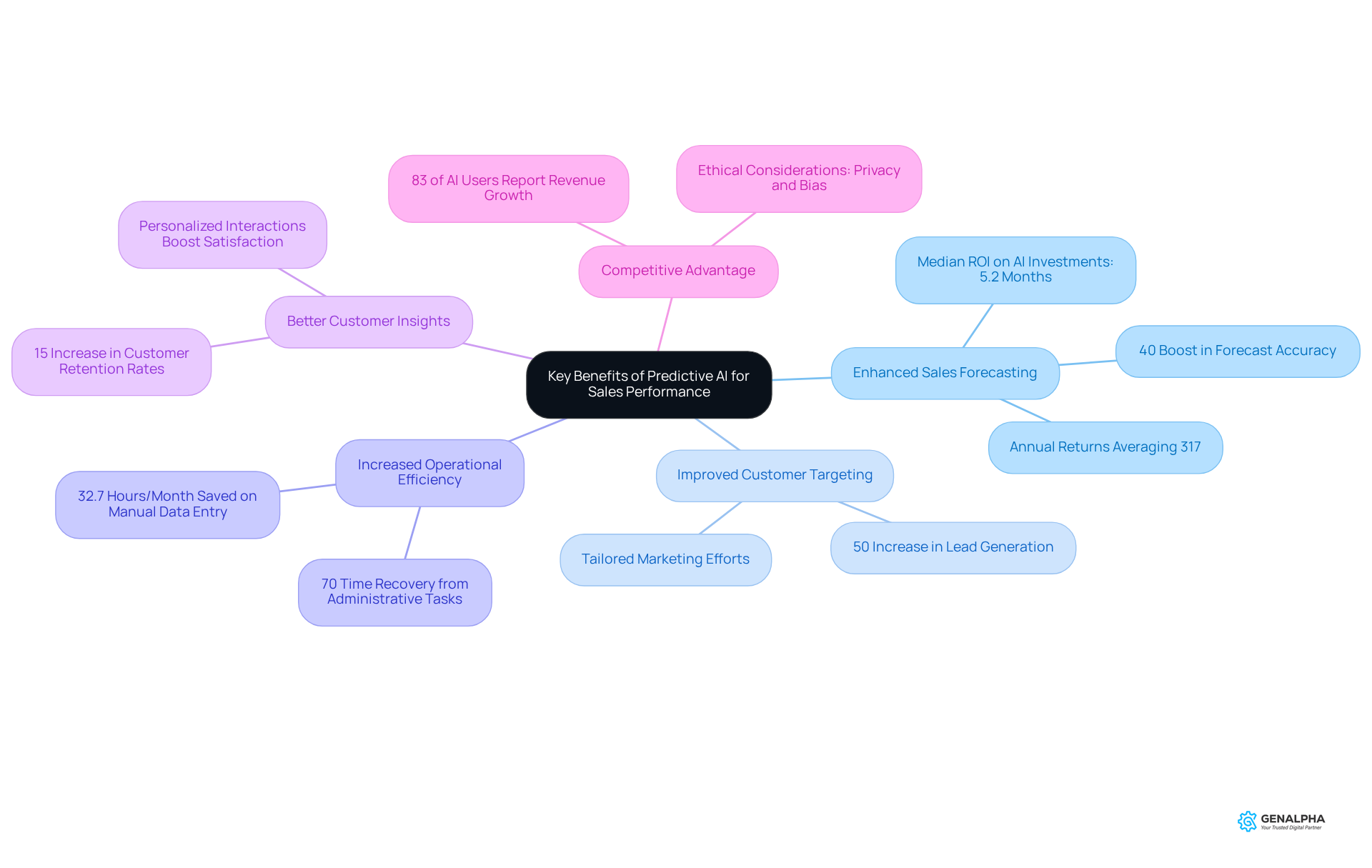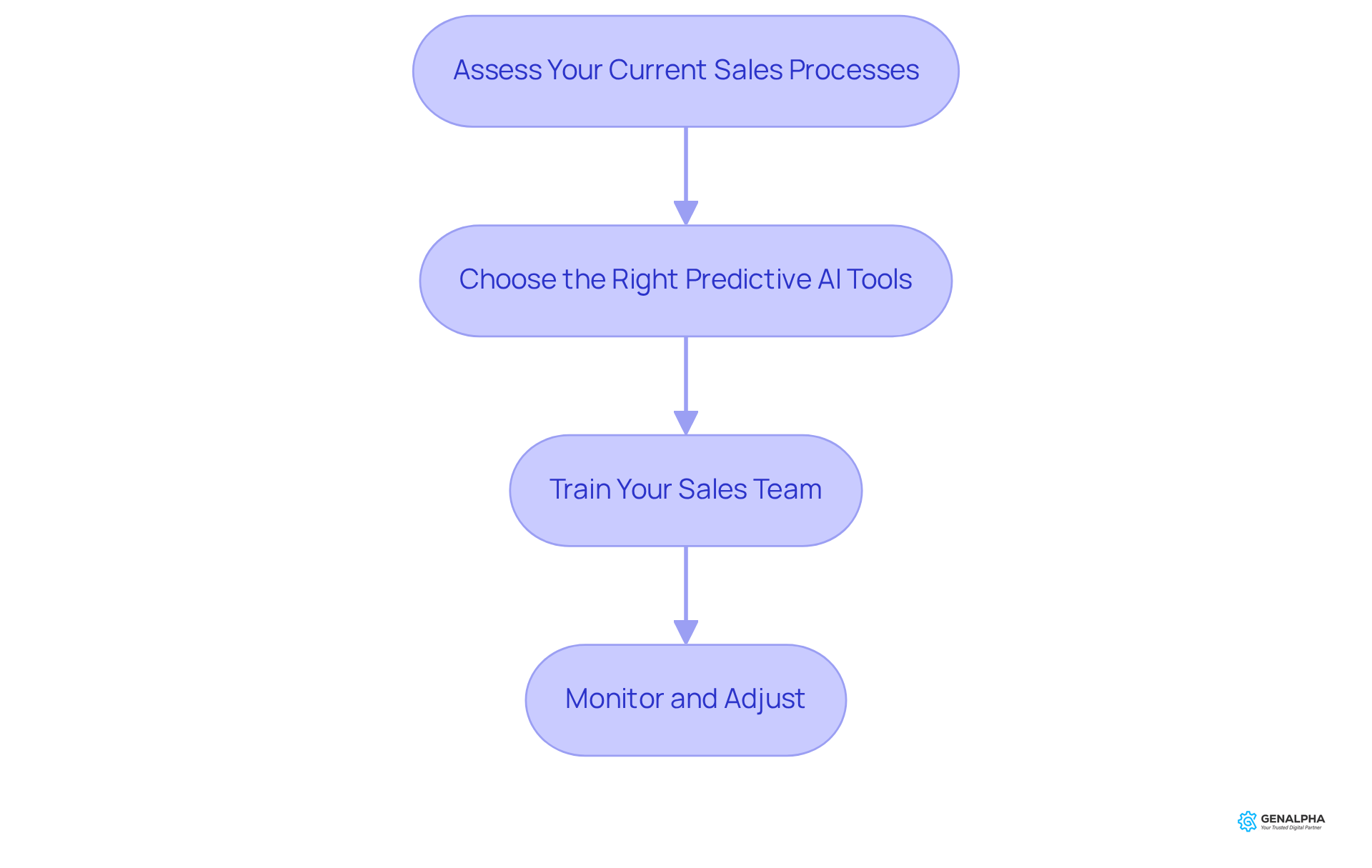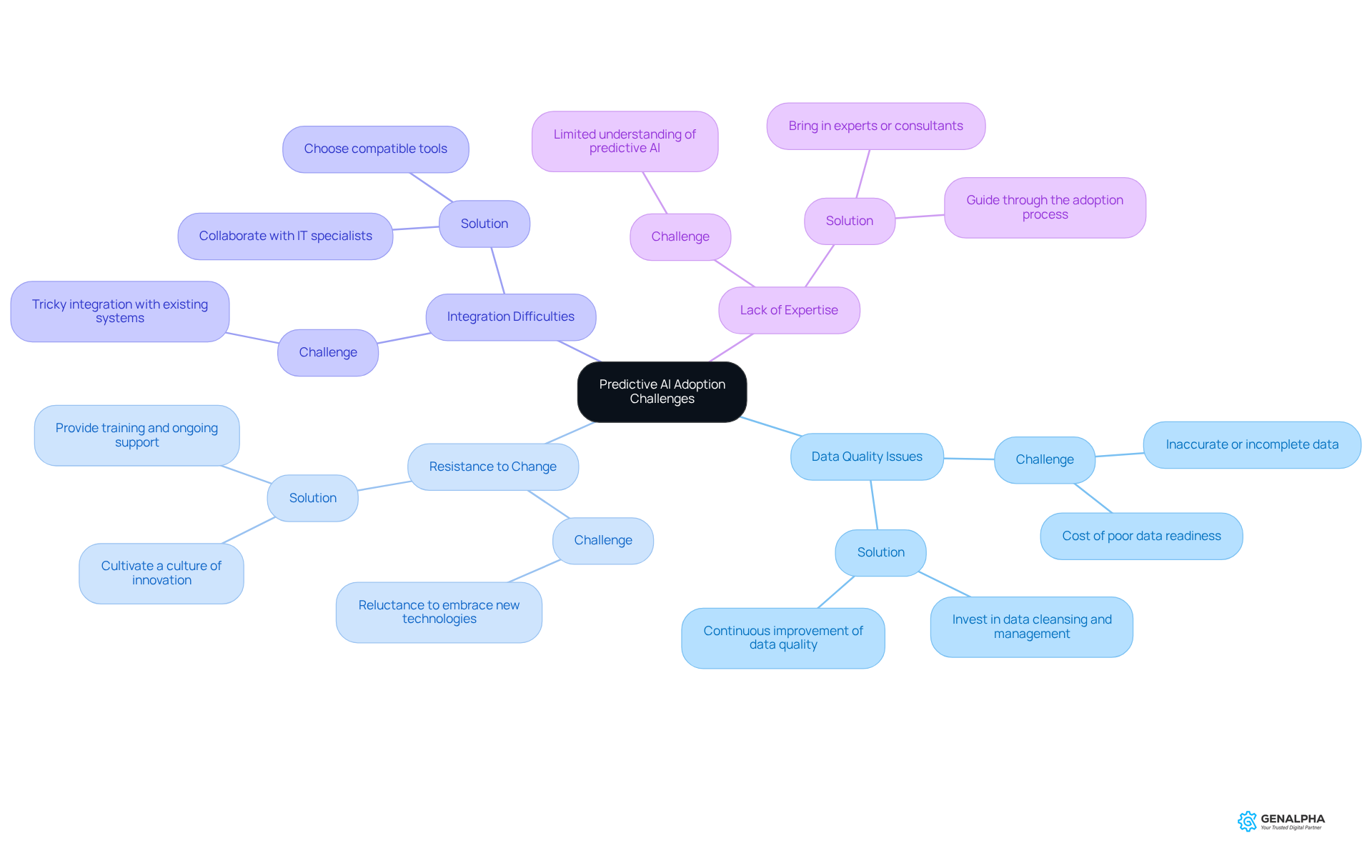Overview
Have you ever wondered how to boost your sales performance? Well, integrating predictive AI might just be the game-changer you need! Here are four key steps to get you started:
- Assess your current processes
- Select the right tools
- Train your teams
- Continuously monitor your outcomes
But why should you care? The benefits are pretty compelling! Imagine improved sales forecasting accuracy, increased operational efficiency, and better customer targeting. These advantages can ultimately give you a competitive edge in the market.
So, let’s dive into these steps together and see how they can transform your sales strategy. Are you ready to take action and enhance your sales performance management?
Introduction
Predictive AI is shaking things up in sales performance management, giving businesses an amazing tool to dive into heaps of data and predict future trends. Imagine being able to tap into advanced algorithms and machine learning—this means better decision-making, smarter customer targeting, and smoother operations for organizations.
But let’s be real: integrating predictive AI comes with its own set of challenges. How can companies tackle the complexities of implementation while reaping all the benefits?
In this article, we’ll explore the key steps to harnessing predictive AI to revamp sales strategies and achieve tangible results. Ready to transform your approach?
Understand Predictive AI and Its Role in Sales Performance Management
Predictive AI is a game-changer, using advanced algorithms and machine learning to sift through past data and forecast future outcomes. This not only boosts sales performance management but also helps businesses spot trends, understand customer behaviors, and identify potential revenue opportunities. By tapping into data from various sources, like customer interactions and market conditions, companies can make savvy decisions that elevate their marketing strategies. Understanding this is key to weaving predictive AI into your sales performance management framework, leading to sharper forecasts and better customer engagement.
Key Concepts of Predictive AI
- Data Analysis: Think of predictive AI as your trusty sidekick that processes huge datasets to reveal patterns that can shape effective sales strategies.
- Forecasting: It’s like having a crystal ball that predicts future revenue trends based on what’s happened before, empowering proactive decision-making and strategic planning.
- Customer Insights: By diving into customer behavior, businesses can tailor their approaches to meet specific needs, boosting engagement and satisfaction.
Importance in Sales Performance Management
- Enhanced Decision-Making: Predictive AI serves up actionable insights that fuel better sales strategies, allowing teams to zero in on high-impact activities.
- Increased Efficiency: Automating data analysis means less time on manual tasks, freeing teams to focus on sealing deals and nurturing relationships.
- Improved Customer Relationships: By anticipating what customers need, businesses can build stronger connections, ultimately ramping up satisfaction and loyalty.
As more organizations embrace forecasting AI, its transformative role in marketing strategies becomes evident. For instance, companies like MajorKey Technologies have seen a 16% revenue boost after integrating AI into their sales tactics, showcasing the tangible benefits of this technology. Plus, analytical forecasting is on track to significantly enhance accuracy, with projections suggesting that by 2025, accuracy rates could soar to 95%. This evolution in marketing strategies underscores the urgency for companies to adopt forecasting AI to remain competitive in an ever-changing market.

Identify Key Benefits of Predictive AI for Sales Performance
Integrating predictive AI into sales performance management brings a host of benefits that can really make a difference:
-
Enhanced Sales Forecasting
Imagine being able to predict sales with pinpoint accuracy. Predictive AI does just that by analyzing historical data and spotting trends. This smart approach helps companies allocate resources better and set realistic sales targets. Studies show that organizations using AI see a 40% boost in forecast accuracy! Plus, businesses typically enjoy a median ROI on AI investments within just 5.2 months, with annual returns averaging an impressive 317%. -
Improved Customer Targeting
What if you could identify the best leads effortlessly? Predictive AI meticulously analyzes customer data to find high-potential leads and tailor marketing efforts accordingly. This focused strategy can lead to a whopping 50% increase in lead generation and appointments, making your sales efforts much more effective. -
Increased Operational Efficiency
Think about all the time your sales team spends on manual tasks. Predictive AI automates data analysis, freeing up valuable time for your team to focus on what really matters—building client relationships and closing deals. In fact, it can help recover around 70% of the time previously spent on administrative duties! -
Better Customer Insights
With predictive AI, you gain deep insights into customer preferences and behaviors. This knowledge allows for personalized interactions, significantly boosting customer satisfaction and loyalty. Companies using AI-driven insights have seen a 15% increase in customer retention rates! As Aya Musallam puts it, "Today, AI-driven forecasting analytics provides sales experts with the insights they require to make wiser choices, secure more agreements, and remain ahead of the curve." -
Competitive Advantage
Adopting predictive AI can set your business apart from competitors still relying on traditional sales methods. By leveraging advanced technology, you can maintain a competitive edge in a rapidly changing market. Did you know that 83% of revenue teams using AI report growth, compared to just 66% of those that don’t? However, it’s essential to keep ethical considerations in mind, such as privacy and algorithmic bias, to ensure responsible implementation.
So, are you ready to embrace predictive AI and transform your approach to sales performance management? The benefits are clear, and the time to act is now!

Implement Predictive AI Solutions in Your Sales Strategy
To effectively integrate predictive AI solutions into your sales strategy, let’s explore some straightforward steps together:
-
Assess Your Current Sales Processes
First things first, take a good look at your existing sales processes. What’s working? What’s not? Identifying inefficiencies, data gaps, and areas that could use some love is crucial. This evaluation will help you see where forecasting AI can really shine, allowing you to optimize operations and improve sales performance management. -
Choose the Right Predictive AI Tools
Next up, it’s time to pick the right predictive AI tools that fit your unique business needs. Think about ease of integration with your current systems, scalability for future growth, and functionalities that directly support your sales team. Tools that automate lead scoring and enhance customer insights can significantly ramp up your outreach effectiveness, as AI tools make it easier to identify and score potential leads. -
Train Your Sales Team
Now, let’s talk training. Investing in comprehensive training for your sales team on how to effectively use predictive AI tools is key to enhancing sales performance management. Make sure they’re ready to interpret data insights and use them strategically in their marketing efforts. This step is essential—organizations using AI tools have reported revenue increases of 13-15% and enhanced ROI by 10-20%, according to McKinsey & Company. Isn’t that impressive? -
Monitor and Adjust
Once you’ve implemented these tools, don’t just set it and forget it! Continuously monitor the performance of your predictive AI solutions. Gather feedback from your marketing team to identify areas for improvement. Regularly examining data insights will help refine your marketing strategies, keeping them effective in a fast-paced marketplace. Embracing these tools not only boosts efficiency but also strengthens customer relationships, ultimately driving growth. And remember, as Matt Dixon wisely puts it, think of AI as Jarvis to Iron Man—transforming how business teams operate.

Troubleshoot Common Challenges in Predictive AI Adoption
Implementing forecasting AI can really boost sales performance, but organizations often hit a few bumps along the way. Let’s take a look at some common challenges and effective strategies to tackle them:
-
Data Quality Issues
Challenge: Inaccurate or incomplete data can throw off predictions, costing organizations an average of $12.9 million each year due to poor data readiness. This really highlights how crucial it is for companies to prioritize data quality in their forecasting AI efforts.
Solution: It’s worth investing in solid data cleansing and management processes to ensure you’re working with high-quality information. This means keeping a close eye on data quality and continuously improving it to support effective forecasting analytics. -
Resistance to Change
Challenge: Sales teams might be a bit reluctant to embrace new technologies, worried about disrupting their established workflows.
Solution: Cultivating a culture of innovation is key! Clearly communicating the benefits of predictive AI—like better forecasting accuracy and enhanced decision-making—can greatly enhance sales performance management. As Piyanka Jain puts it, "Everybody needs data literacy, because data is everywhere. It’s the new currency, it's the language of the business." Providing thorough training and ongoing support can also help ease the transition and encourage adoption. -
Integration Difficulties
Challenge: Integrating predictive AI tools with existing systems can get tricky and may cause some operational hiccups.
Solution: Team up with IT specialists to ensure a smooth integration process. Choosing tools that are designed to work well with your current systems can really simplify things and reduce any potential friction. -
Lack of Expertise
Challenge: A limited understanding of predictive AI can hold back effective implementation and use.
Solution: Consider bringing in experts or consultants who can guide you through the adoption process. Their expertise can help you navigate the complexities of predictive analytics and ensure you’re getting the most out of your investment in these technologies. For example, Unilever's successful use of AI for demand prediction shows how expert guidance can lead to improved operational efficiency.

Conclusion
Predictive AI is truly a game-changer in sales performance management, allowing organizations to tap into data-driven insights for smarter decision-making. With advanced algorithms and machine learning at their disposal, businesses can boost their forecasting abilities, enhance customer engagement, and uncover new revenue streams. In today’s competitive landscape, this transformative technology isn’t just a nice-to-have; it’s essential for staying ahead.
Let’s take a closer look at some of the key benefits of predictive AI. We’re talking about:
- Improved sales forecasting accuracy
- Better customer targeting
- Increased operational efficiency
- Deeper insights into customer behavior
These perks can lead to a significant uptick in sales performance—just consider the stats: a 40% jump in forecasting accuracy and an impressive 317% average ROI on AI investments. Plus, the steps to implement predictive AI solutions—from evaluating current processes to training your sales teams—show a clear path to leveraging this technology effectively.
So, why is embracing predictive AI not just an option but a must for businesses wanting to thrive in today’s fast-paced market? By tackling common hurdles like data quality issues and resistance to change, organizations can unlock the full power of predictive analytics. As the sales landscape evolves, the time to make your move is now. Investing in predictive AI not only enhances your sales performance management but also sets your business up for long-term success. Are you ready to take that leap?
Frequently Asked Questions
What is Predictive AI?
Predictive AI is a technology that uses advanced algorithms and machine learning to analyze past data and forecast future outcomes, enhancing sales performance management and helping businesses identify trends and revenue opportunities.
How does Predictive AI help in sales performance management?
It boosts sales performance management by providing insights from data analysis, enabling better forecasting, and understanding customer behaviors, which leads to improved marketing strategies and decision-making.
What are the key concepts of Predictive AI?
Key concepts include data analysis, which reveals patterns for effective sales strategies; forecasting, which predicts future revenue trends; and customer insights, which help tailor approaches to meet customer needs.
What are the benefits of using Predictive AI in sales?
Benefits include enhanced decision-making through actionable insights, increased efficiency by automating data analysis, and improved customer relationships by anticipating customer needs.
Can you provide an example of a company benefiting from Predictive AI?
MajorKey Technologies experienced a 16% revenue boost after integrating AI into their sales tactics, demonstrating the tangible benefits of this technology.
What is the future outlook for analytical forecasting accuracy?
Projections suggest that by 2025, the accuracy rates for analytical forecasting could reach 95%, highlighting the importance of adopting forecasting AI to remain competitive.




